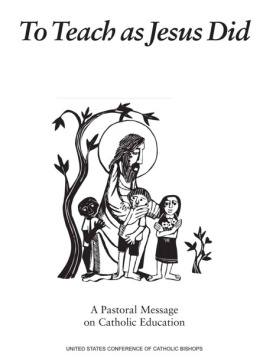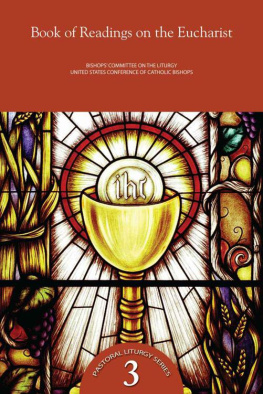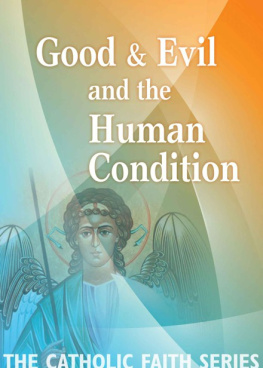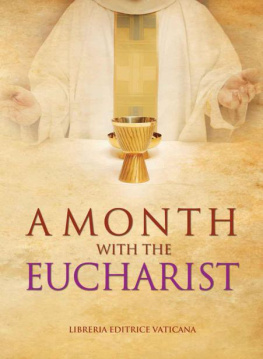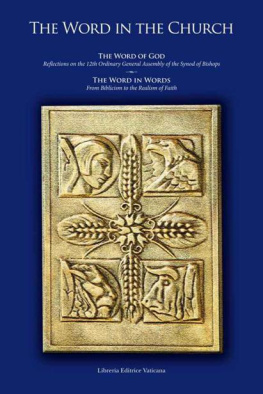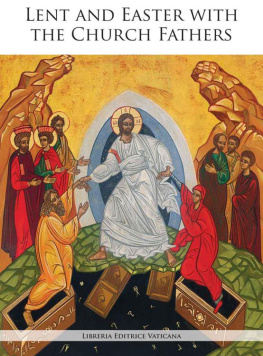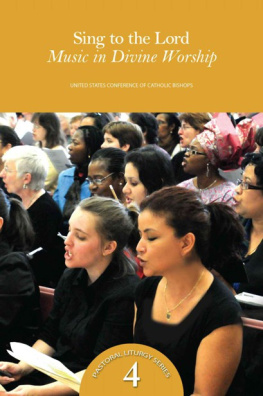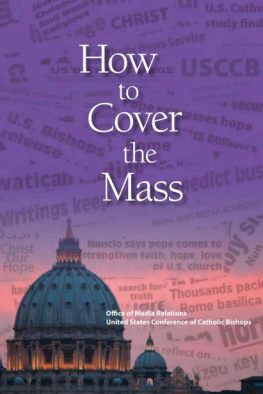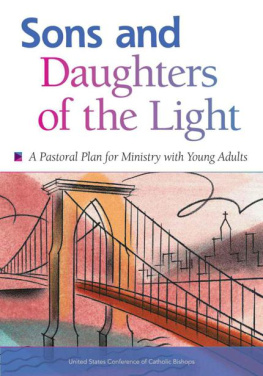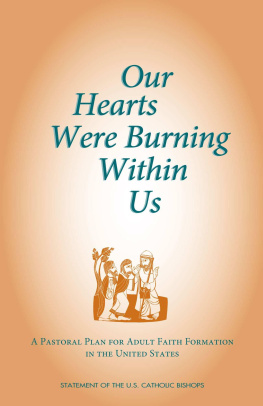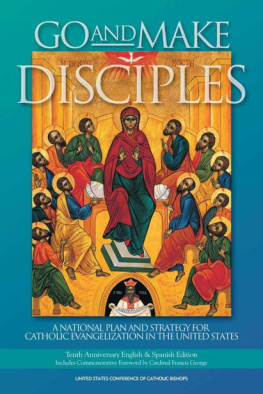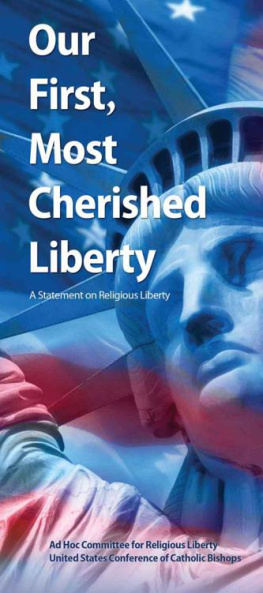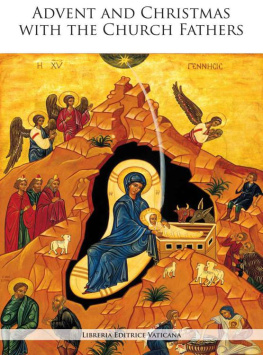United States Conference of Catholic Bishops - To Teach as Jesus Did
Here you can read online United States Conference of Catholic Bishops - To Teach as Jesus Did full text of the book (entire story) in english for free. Download pdf and epub, get meaning, cover and reviews about this ebook. year: 2012, publisher: United States Conference of Catholic Bishops, USCCB, genre: Religion. Description of the work, (preface) as well as reviews are available. Best literature library LitArk.com created for fans of good reading and offers a wide selection of genres:
Romance novel
Science fiction
Adventure
Detective
Science
History
Home and family
Prose
Art
Politics
Computer
Non-fiction
Religion
Business
Children
Humor
Choose a favorite category and find really read worthwhile books. Enjoy immersion in the world of imagination, feel the emotions of the characters or learn something new for yourself, make an fascinating discovery.
- Book:To Teach as Jesus Did
- Author:
- Publisher:United States Conference of Catholic Bishops, USCCB
- Genre:
- Year:2012
- Rating:4 / 5
- Favourites:Add to favourites
- Your mark:
- 80
- 1
- 2
- 3
- 4
- 5
To Teach as Jesus Did: summary, description and annotation
We offer to read an annotation, description, summary or preface (depends on what the author of the book "To Teach as Jesus Did" wrote himself). If you haven't found the necessary information about the book — write in the comments, we will try to find it.
United States Conference of Catholic Bishops: author's other books
Who wrote To Teach as Jesus Did? Find out the surname, the name of the author of the book and a list of all author's works by series.
To Teach as Jesus Did — read online for free the complete book (whole text) full work
Below is the text of the book, divided by pages. System saving the place of the last page read, allows you to conveniently read the book "To Teach as Jesus Did" online for free, without having to search again every time where you left off. Put a bookmark, and you can go to the page where you finished reading at any time.
Font size:
Interval:
Bookmark:
This pastoral message is the product of wide consultation involving many individuals and groups. It reflects a painstaking effort to obtain the views of persons from a variety of backgrounds and interests priests, religious men and women, lay people, professional educators at all levels of education, parents, students. Much of this consultation took place at the national level but even more occurred at the local diocesan level, where bishops sought out the views of the people regarding various drafts of the document. While, in the last analysis, the pastoral represents the views of the American bishops and only they are responsible for what it says, grateful recognition is due the indispensable contributions of all those who participated in the collaborative effort involved in its preparation, itself in many ways a model of the shared responsibility for educational ministry which the document envisions and warmly recommends.
The pastoral is also written against the background of the Second Vatican Councils Declaration on Christian Education which requested national hierarchies to issue detailed statements on the educational ministry considered in the context of the Church and society in their own countries.
The pastorals scope is broad but not all-encompassing. A virtually endless catalogue of programs, institutions, and activities could be gathered together under the rubric of education. It was therefore necessary to employ some principles of exclusion to avoid producing a treatise of excessive length and, perhaps, superficiality. This document is concerned in the main with those agencies and instruments under Church sponsorship which are commonly recognized as educational by professional and layman alike and through which a deliberate and systematic effort is made to achieve what are commonly recognized as educational objectives. This is not to discount the educational/formational role played by communications media, liturgy indeed one of the most powerful and appropriate educative instruments at the disposal of the Church and countless other familial, social, and pastoral efforts, but only to state that they could not be considered in depth in this particular document. In addition, some extremely important educational programs are not treated here because they have already received detailed attention by the bishops elsewhere (e.g., the education of priests, which is the subject of the National Conference of Catholic Bishops recently published Program of Priestly Formation ).
As the concluding section of this document states, the pastoral is not to be regarded as the final word on its subject on either the theoretical or practical level. It will serve a useful purpose if it proves a catalyst for efforts to deal realistically with problems of polarization and of confusion now confronting the educational ministry. Thus one hopes that the ideas it contains will be studied closely, criticized intelligently, and, where possible, implemented successfully. In the years ahead American Catholics should continue to articulate and implement their commitment to the educational ministry in ways suited to their times and circumstances. Within both the Christian community and the educational ministry the mission to teach as Jesus did is a dynamic mandate for Christians of all times, places, and conditions.
Lord, said Thomas, we do not know where you are going. How can we know the way? Jesus told him: I am the way, and the truth, and the life; no one comes to the Father but through me. If you really knew me, you would know my Father also. From this point on you know him; you have seen him. (John, 14:5-7)
Proclaiming the Gospel is a perennial task and joy for the Church of Jesus Christ. Rarely if ever has it been more pressing a need, more urgent a duty, and more ennobling a vocation than in these times when mankind stands poised between unprecedented fulfillment and equally unprecedented calamity.
Catholic education is an expression of the mission entrusted by Jesus to the Church He founded. Through education the Church seeks to prepare its members to proclaim the Good News and to translate this proclamation into action. Since the Christian vocation is a call to transform oneself and society with Gods help, the educational efforts of the Church must encompass the twin purposes of personal sanctification and social reform in light of Christian values.
Thus one crucial measure of the success or failure of the educational ministry is how well it enables men to hear the message of hope contained in the Gospel, to base their love and service of God upon this message, to achieve a vital personal relationship with Christ, and to share the Gospels realistic view of the human condition which recognizes the fact of evil and personal sin while affirming hope.
Christian hope is of special importance today when many people express a naive optimism which fails to admit the reality and effects of sin upon the individual and society, and when many others, fully aware of evil in themselves and society, are tempted to indulge in crippling despair. In face of these two attitudes the Church can make a unique contribution by preaching the Gospel of hope. The Gospel proclaims the dignity and freedom of each person and gives assurance that men are right to hope for personal salvation and for the ultimate conquest of sin, isolation, injustice, privation and death because these evils have already been conquered in the person of Jesus Christ.
The success of the Churchs educational mission will also be judged by how well it helps the Catholic community to see the dignity of human life with the vision of Jesus and involve itself in the search for solutions to the pressing problems of society. Christians are obliged to seek justice and peace in the world. Catholics individually and collectively should join wherever possible with all persons of good will in the effort to solve social problems in ways which consistently reflect Gospel values.
Since special knowledge and skills are needed for the effective pursuit of justice and peace, Christian education is basic to the effort to fulfill the demands of the Gospel in many different communities: family, church, neighborhood, working world, civic arena, international scene. To discern the practical demands of justice is often difficult. Yet Christians must be prepared to perform these difficult tasks of discernment; social needs must in the years to come take first place among (their) preoccupations. (Pope Paul VI, A Call to Action, 7)
The Church is an instrument of salvation and a sign of Christ in the world today. His mission is the Churchs mission; His message is the Churchs message. Jesus was sent to reveal the deepest truth about God and at the same time reveal man to himself and make his supreme calling clear. ( The Church Today, 22) He commissioned His Church to do the same; to teach men and women about God and themselves, to foster their love of God and one another.
Education is one of the most important ways by which the Church fulfills its commitment to the dignity of the person and the building of community. Community is central to educational ministry both as a necessary condition and an ardently desired goal. The educational efforts of the Church must therefore be directed to forming persons-in-community; for the education of the individual Christian is important not only to his solitary destiny but also to the destinies of the many communities in which he lives.
The educational mission of the Church is an integrated ministry embracing three interlocking dimensions: the message revealed by God (didache) which the Church proclaims; fellowship in the life of the Holy Spirit (koinonia); service to the Christian community and the entire human community (diakonia). While these three essential elements can be separated for the sake of analysis, they are joined in the one educational ministry. Each educational program or institution under Church sponsorship is obliged to contribute in its own way to the realization of the threefold purpose within the total educational ministry. Other conceptual frameworks can also be employed to present and analyze the Churchs educational mission, but this one has several advantages: it corresponds to a long tradition and also meets exceptionally well the educational needs and aspirations of men and women in our times.
Font size:
Interval:
Bookmark:
Similar books «To Teach as Jesus Did»
Look at similar books to To Teach as Jesus Did. We have selected literature similar in name and meaning in the hope of providing readers with more options to find new, interesting, not yet read works.
Discussion, reviews of the book To Teach as Jesus Did and just readers' own opinions. Leave your comments, write what you think about the work, its meaning or the main characters. Specify what exactly you liked and what you didn't like, and why you think so.

